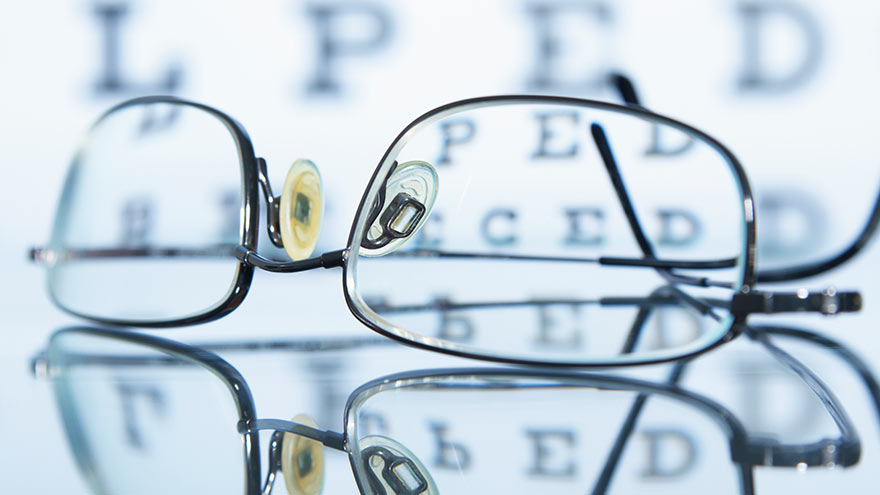Six Tips for Healthy Vision
July 08, 2021

Clear vision is an essential part of overall health and there are daily habits we can adopt to keep our eyes seeing clearly. Mitchell Strominger, M.D., a registered ophthalmologist with Renown Health specializing in pediatric ophthalmology and neuro-ophthalmology, offers some everyday tips to keep you focused on eye health.
Know your family’s vision history
Look to your parents and grandparents for clues about the future of your eye health. Were they near-sighted at a young age? Do they have a history of eye crossing or a lazy eye? Did they develop glaucoma or macular degeneration (AMD)? Some genes have a strong association with eye health, specifically macular degeneration.
AMD is a leading cause of blindness worldwide and the top cause of vision loss and blindness for Americans over 65, according to the Centers for Disease Control and Prevention (CDC). Also be aware certain medical conditions, such as diabetes, high blood pressure and liver disease, increase the risk of long-term eye problems.
Receive regular vision screening exams
Children under three need vision screening examinations by their pediatrician. A medical concern or family history warrants a comprehensive eye examination by a pediatric ophthalmologist (or general ophthalmologist or optometrist who has experience with children) per the American Academy of Ophthalmology (AAO).
Vision screenings should occur every two years throughout adolescence unless pain, eye crossing, difficulty seeing the board or reading, or other eye concerns occur. In adulthood the risk of eye problems increases over age 40, so the AAO recommends regular dilated exams. When your pupils are dilated it allows your eye care professional a more accurate view of your retina and optic nerve, located in the back of your eye. This allows them to look for AMD or other eye problems. Eye diseases can be caught at their earliest stages during a dilated eye exam.
“It is especially important to have your child evaluated as soon as possible if there is any concern for eye crossing or lazy eye,” says Dr. Strominger. “The visual system develops in the early years so intervention, whether it be glasses, eye patching to strengthen the vision in one eye, or eye muscle surgery is critical. Children at risk include those who are born premature, have development abnormalities, genetic disorders such as Downs syndrome, or a strong family history and should be evaluated at a young age. Often small problems are not clearly evident and cannot be picked up on routine screening examinations in the pediatrician’s office.”
Block the sun, improve your vision
Everyone knows not to stare directly into the sun, but indirect ultraviolet (UV) sun rays can cause serious harm over time. According to the National Eye Institute, sunglasses (or a protective UV tint) are a daily must to protect your eyes from:
- Cataracts (a clouding of the eye’s lens causing blurred vision)
- AMD - macular degeneration
- Pterygium (a tissue growth over the white surface of the eye that can cause astigmatism)
Look for sunglasses which block 99 to 100 percent of both UVA and UVB rays. You still need sunglasses if your contact lenses block UV rays. Sun rays can damage your eyelids and other tissue not covered by contact lenses. Wearing sunglasses protects your entire eye area.
Eat colorful meals
Your eyes need vital nutrients to keep them healthy including vitamin C, zinc, beta carotene and copper. A diet filled with citrus fruits and a variety of vegetables provide these essential nutrients. Regularly filling up on fish high in omega-3 fatty acids (salmon, tuna, sardines) may reduce your risk of AMD and help maintain your eye health. Green, leafy vegetables (kale, spinach, collard greens) containing lutein and zeaxanthin are also a must for your dinner plate.
Water your eyes
Eyes, like the rest of your body, need plenty of water to prevent dehydration. Make sure you stay hydrated and steer clear of smoke to avoid dry eyes and irritation. Hours staring at the computer screen can also make your eyes feel dry or tired. Try regularly refreshing them with lubricating eye drops. Taking frequent computer breaks is also important. Follow the 20/20/20 rule: every 20 minutes, look at an object 20 feet away from you for 20 seconds.
Eye makeup can also lead to dry eye as the glands at the base of the eyelashes may become clogged, causing dry eye. Make sure all eye makeup is hypoallergenic and is thoroughly removed with a gentle cleanser for the delicate eye area each day.
Stop Smoking (or never start)
Smoking is harmful to every part of your body, including your eyes. It's not only linked to cancer and heart disease but also cataracts, AMD, dry eye, optic nerve problems and many other problems. Smoking during pregnancy can also harm the eyes of the unborn child. If you currently smoke take steps to quit and your entire body will benefit.